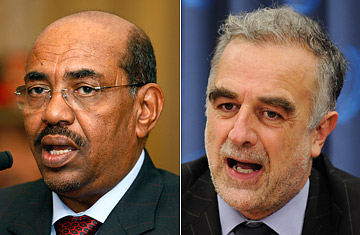
Sudanese President Omar Hassan al-Bashir, left, and prosecutor of the International Criminal Court Luis Moreno-Ocampo
(2 of 2)
But Moreno-Ocampo had diplomatic allies as well. Liechtenstein's ambassador to the U.N. gave the ICC a huge amount of public exposure by premiering the documentary Darfur Now at the U.N. headquarters the day before Kouchner's conference. The film tells six stories out of Darfur, and one of them is Moreno-Ocampo's. The presence of Angelina Jolie ensured a packed house and media attention.
By October, Moreno-Ocampo felt that his case against al-Bashir was clear. But he faced a U.N. that seemed out of touch with what was going on in Darfur. Diplomats at the world body began calling violence in Darfur "intra-tribal clashes" — reminiscent of the "ancient tribal hatreds" definition that stalled intervention in Bosnia for so long. "I said the janjaweed and the army attacked in September and October, and this is not intra-tribal clashes," says Moreno-Ocampo. "Haroun obstructing humanitarian assistance in the camps is not intra-tribal clashes." Moreno-Ocampo challenged the Security Council, asking why they were protecting Haroun.
Failing with the West, Moreno-Ocampo spent the next six months traveling the Arab world — Cairo, Qatar, Saudi Arabia, Jordan — to assure them of his impartiality and to bring them onto his side. Then in June, the ICC got a break.
Security Council briefings are usually gray-tongued, empty-seated affairs. But this time, the room was packed with ICC advocates. Bruno Stagno, the Foreign Minister of Costa Rica, broke the ice: "The government of Sudan is toying with us, toying with human dignity, toying with the authority of this Council." Stagno said that Khartoum's promotion of Haroun and its refusal to arrest him is cynicism. He charged the Security Council with appeasing Khartoum, and he invoked the genocides in Cambodia, Bosnia and Rwanda. "You could see people looking at their notes, thinking, Uh-oh, I can't read this official speech, I will look stupid," says an ICC official who was at the meeting. And then, to everyone's surprise, South Africa, which up until then under the direction of President Thabo Mbeki had accommodated Khartoum (much as they are accommodating Zimbabwe's Robert Mugabe today), criticized Sudan and the Security Council's acquiescence to Khartoum. Panama and Croatia joined in. The exuberant speeches caught people short.
The game had changed entirely. "Up to now, we were Sisyphus," says the ICC official, who asked not to be named. "We would go with our fantastic evidence, facts that say Haroun has committed crimes and is in a position to commit new crimes. They'd listen, go back and then forget." This time Costa Rica vowed to put forth a resolution, which would require 9 out of 15 Security Council votes. With the Olympics approaching and the international focus on its handling of Tibet, China did not want to be seen as accommodating the Sudanese. Nor did Libya or Russia. The presidential statement went through and for the first time, the Security Council in effect said that the ICC exists and its rulings are legally binding.
The big states are "furious with me," acknowledges Moreno-Ocampo, alluding to criticism that the international court's indictment will damage the pursuit of a peace agreement in the country. "But we're creating a global community based on the law."
